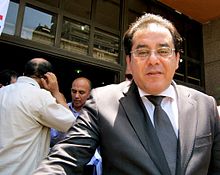Aiman only
Aiman Nur ( Arabic أيمن نور Aiman Nūr ; alternative transcriptions Ayman Nour or Eiman Nour ; * December 5, 1964 in al-Mansura ) is an Egyptian politician and long-time chairman of the party al-Ghad (the morning), which was represented in the Egyptian lower house with seven of 454 seats. Since 2012 he has been the spokesman for the new conference party .
Life
In 1985 Aiman Nur graduated from al-Mansourah University Law School , earning a Masters in Political History and a PhD in International Law. On October 27, 2004, he founded his Party of the Morning .
Only was arrested on January 29, 2005. His party was accused of forging documents for admission to the 2005 parliamentary elections, and the party itself spoke of an invention in the context of the political dispute. The United States exercised after the arrest of pressure on Egypt to open democratic: eliminate the effects of US Secretary of State Condoleezza Rice said in February a trip to Egypt from, Nour called a 'prisoner of freedom' and called on the Egyptian government to finally encrusted Reform system.
In March 2005, a delegation made up of Members of the European Parliament, led by one of its Vice-Presidents, Edward McMillan-Scott (UK, Conservative Party), traveled to Cairo to push for his release. On March 12, 2005, Nur was released from Cairo prison six weeks after his arrest, on bail of the equivalent of 1,300 euros .
The Egyptian electoral commission admitted Aiman Nur along with nine other candidates for the first presidential election in Egypt with several candidates in September 2005. According to official information, Nur came to 7.3 percent of the votes cast as the best opposition candidate in the election. Only 23 percent of the electorate took part in the election, which was overshadowed by numerous reports of manipulation.
On December 24, 2005, he was sentenced to 5 years in prison for forging documents to form his party. The judgment was heavily criticized from many quarters. Ayman Nour appealed against that judgment appeal lodged and entered despite his diabetes disease in a two-week hunger strike.
The White House Press Secretary issued the following press release on the same day:
The United States is deeply troubled by the conviction today of Egyptian politician Ayman Nour by an Egyptian court. The conviction of Mr. Nour, the runner-up in Egypt's 2005 presidential elections, calls into question Egypt's commitment to democracy, freedom, and the rule of law. We are also disturbed by reports that Mr. Nour's health has seriously declined due to the hunger strike on which he has embarked in protest of the conditions of his trial and detention. The United States calls upon the Egyptian government to act under the laws of Egypt in the spirit of its professed desire for increased political openness and dialogue within Egyptian society, and out of humanitarian concern, to release Mr. Nour from detention.
On February 18, 2009, he was released from custody on health grounds, according to the Egyptian Attorney General. He has diabetes and heart problems.
In 2012 Nur planned to run as a candidate for the presidential election. However, in mid-April, just under a month before the election, he was expelled from the electoral commission. There is a law in force that says that former prisoners are not allowed to vote for six years after serving their sentence or pardon.
Views
Following his release from custody, he attended a memorial service for Egyptian troops who fought against Israel in 1948 , during which he allegedly made anti-Semitic statements. He later denied this in an article in English, stating that his criticism was directed against Israel and not against the Jewish people as a whole. According to an Egyptian blogger report, he later denied this clarification to the Egyptian public , in particular the statement that he was in favor of the Israeli-Egyptian peace treaty .
After his release, he announced that he would continue to get involved. However, he was banned from working as a politician for several years.
On January 25, 2011, mass protests began in Egypt, which led to the resignation of President Hosni Mubarak on February 11, 2011 . According to a newspaper report by Neues Deutschland (2011), Nur takes the view that the peace treaty with Israel must now be renegotiated.
Web links
- FreeAymanNour.org (Aiman Nurs Release Petition)
Individual evidence
- ↑ She did not travel to Egypt until February 2006, after Nour's condemnation, see below
- ^ Former Egyptian Presidential Candidate Sentenced to 5 Years Hard Labor Voice of America December 24, 2005
- ^ Statement on Conviction of Egyptian Politician Ayman Nour . US National Archives . December 24, 2005. Retrieved June 6, 2009.
- ^ Opposition Nour released from prison , Der Standard, February 19, 2009
- ^ Presidential election in Egypt: Election Commission excludes ten candidates at fr-online.de, April 14, 2012 (accessed on April 14, 2012).
- ↑ Why Are Egypt's 'Liberals' Anti-Semitic? In: The Wall Street Journal . October 28, 2009, accessed February 22, 2011 .
- ^ I Reject Anti-Semitism and Respect Egypt's Pluralism. In: The Wall Street Journal . October 1, 2010, accessed February 22, 2011 .
- ^ Egyptian Liberals and Anti-Semitism. (No longer available online.) November 4, 2010, archived from the original on March 7, 2011 ; accessed on February 22, 2011 (English).
- ↑ zeit.de: The staff of the beginning
- ↑ The revolution and its false partners. In: New Germany. February 19, 2011, accessed February 22, 2011 .
| personal data | |
|---|---|
| SURNAME | Just Aiman |
| ALTERNATIVE NAMES | Nūr, Aiman; Nour, Ayman; Nour, Eiman; أيمن نور (Arabic) |
| BRIEF DESCRIPTION | Egyptian politician and leader of the al-Ghad party |
| DATE OF BIRTH | 5th December 1964 |
| PLACE OF BIRTH | al-Mansura |
